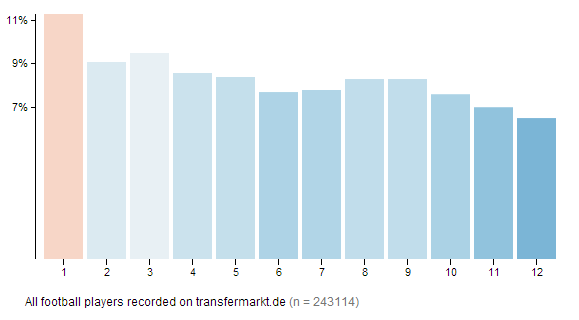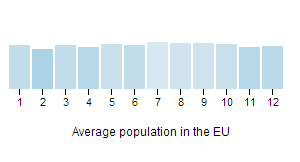Quick 8 Man Rotation take for a busy Tuesday. Check out the chart below, a birth month distribution of about 240,000 professional soccer players taken from a database that tracks player signing and transfers and was compiled by David Bauer:

Notice anything strange in the pattern distribution?
How about the unusually high (relative) percentages of professional soccer players born in the first quarter of the year, particularly in January (11.3%), and the relatively lower percentages of players that were born at the end of the year (down to a low of 6.5% in December).
It might not seem like that much of a disparity, but consider a similar chart that shows the birth month distribution of the entire population of the European Union, (below), and you can see some striking differences.

As you can see from the total EU chart, people are born more or less consistently across the months of the year, with only small differences in percentages born in the highest percentage months.
But professional soccer players? They show a striking and increased likelihood to be born in the first three months of the year.
This phenomenon is attributed to the traditional soccer (and other sports as well) youth development process that groups players of the same age (Under 10, Under 16, etc.), for training and competitions.
The theory then is that at those younger ages the physical size and skill differentials between an Under 10 year old player born in January and one born in December are really large, and noticeable. The player born in January then receives more attention, better coaching, more opportunities, etc., as he/she is simply deemed a better prospect than the player born in December. This then plays out again and again over time resulting in more of the 'early year' born players making it to the professional levels.
No one knows if this is really true and explains the birth month disparity of professional soccer players compared to the overall population, but it does seem at least plausible.
So circle this back to your HR/Talent shop. Does this kind of analysis make sense for you to consider? Is there a similar performance effect that can be seen in other types of occupations besides professional soccer based on birth month distribution? Are comparatively "older for their grade level" people likely to turn out to be better at more than just playing sports? Do you care about the birth month of a candidate or an employee?
I don't know. I guess it seems unlikely. But even so there is still a takeaway from this data which is this: If you want little Junior to grow up to be a pro soccer player, you may want to plan around a January birth date, (if it isn't too late).
Have a great Tuesday.